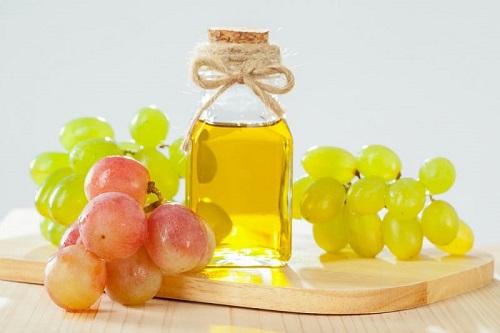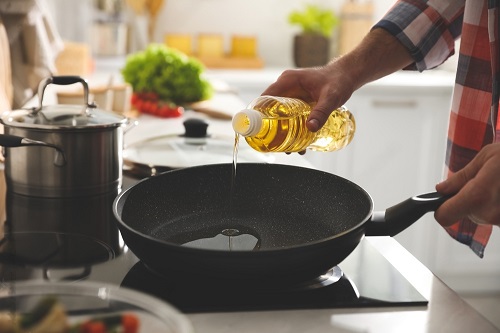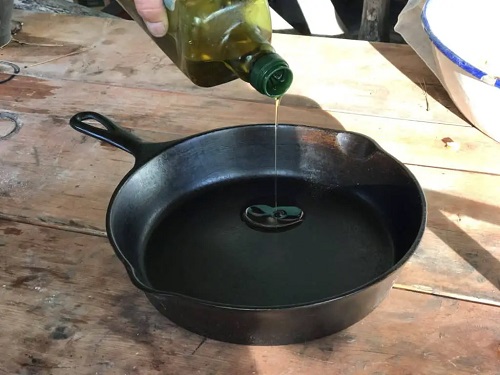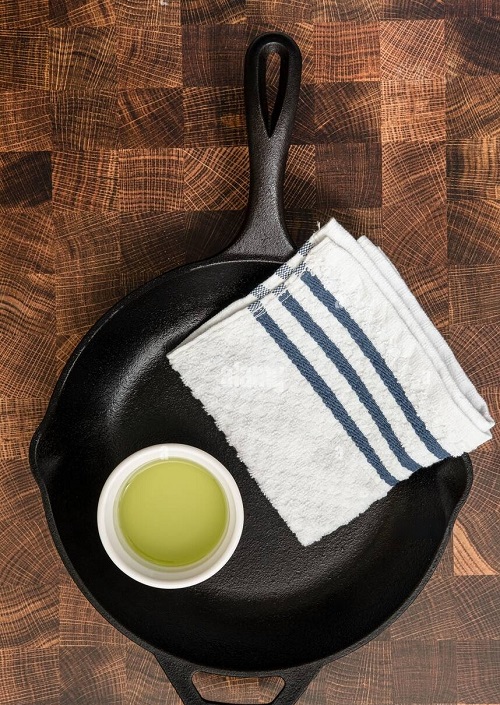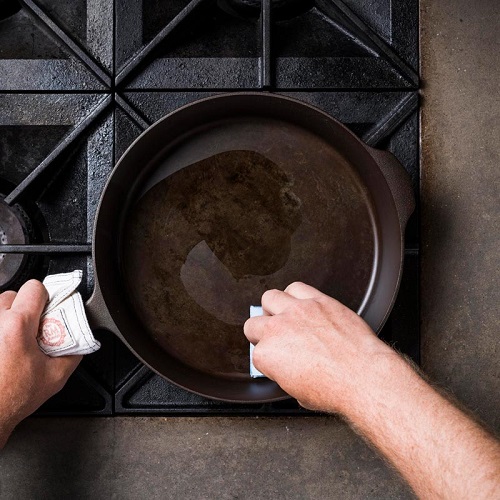Discover how Seasoning Cast Iron with Grapeseed Oil can provide a non-stick, long-lasting finish besides enhancing the flavor of your dishes!
One essential tool that every home chef should have is a trustworthy cast iron skillet. These versatile pieces of cookware are known for their ability to distribute heat evenly and retain it for perfect cooking. But did you know properly seasoning your cast iron skillet is crucial for its longevity and performance? This article will explore the art of Seasoning Cast Iron with Grapeseed Oil and help you elevate your cooking game to new heights!
Learn about Castor Oil vs. Grapeseed Oil here
Why Season Cast Iron?
Cast iron cookware boasts a rich history, known for its exceptional heat retention and distribution capabilities. However, seasoning, often misconstrued as a mere oil coating, holds pivotal importance. When oil meets heat on cast iron, a chemical process called polymerization occurs, forming a robust layer on the pan’s surface. This layer ensures longevity, fends off sticking, and imparts a premium non-stick quality, making your cooking truly professional.
Can You Season Cast Iron with Grapeseed Oil?
Grapeseed oil is a true star in the realm of cast iron seasoning, bringing you a wide array of benefits.
1. High Smoke Point
With a high smoke point exceeding 420°F, grapeseed oil is an ideal option for seasoning cast iron. This allows for the polymerization process, where oils are heated beyond their smoke point to form a protective coating, enhancing your cookware’s performance.
2. Exceptional Non-Stick Surface
Grapeseed oil creates a flawless non-stick surface on your cast iron cookware. It establishes a smooth and sleek layer, preventing food from adhering and simplifying cleanup.
3. Enhanced Durability
Seasoning with grapeseed oil acts as a protective barrier, safeguarding your cast iron from rust and corrosion. This extended lifespan ensures your cherished cookware serves you for years to come.
4. Health-Conscious Cooking
Grapeseed oil, celebrated for its healthful attributes, brings a mindful touch to seasoning. With its high content of beneficial fats and antioxidants, it’s a choice that adds to your wellness.
5. Streamlined Maintenance
A well-seasoned cast iron pan with grapeseed oil demands minimal upkeep. Its inherent non-stick properties ease cleaning, turning post-cooking cleanup into a breeze.
6. Eco-Friendly Selection
Grapeseed oil, derived from the leftover seeds of grapes after wine production, aligns with sustainable choices. It repurposes a byproduct and avoids waste.
7. Economical Choice
Grapeseed oil’s widespread availability and cost-effectiveness make it a prudent choice for seasoning. A small quantity goes a long way, ensuring efficient use.
Learn about Seasoning Cast Iron with Coconut Oil here
How to Season Cast Iron with Grapeseed Oil?
1. Preparation Phase
- Start by meticulously cleaning the cast iron pan with hot water and a brush, ensuring all debris is removed.
- Ensure the pan is entirely dry to prevent moisture from interfering with the seasoning process.
- Preheat your oven to 400°F (200°C) to prepare for the baking phase.
2. Coating with Grapeseed Oil
- Pour a small amount of grapeseed oil onto a cloth or paper towel.
- Gently rub the oil across the interior and exterior of the pan, ensuring comprehensive coverage.
3. Baking Phase
- Place the oiled cast iron pan upside down on the oven’s middle rack.
- Lay aluminum foil or a baking sheet on the lower rack to catch potential drips.
- Allow the pan to bake for approximately one hour, enabling the oil to polymerize into a durable, non-stick layer.
4. Cooling and Storage
- Turn off the oven and allow the pan to cool gradually inside.
- Once cooled, gently wipe away any excess oil that may have pooled up.
- Store your well-seasoned cast iron pan dry until its next use.
You can also Explore Seasoning Cast Iron with Canola Oil here
Maintenance and Care
- Choose Ingredients Thoughtfully: Opt for ingredients that complement your seasoning efforts, avoiding acidic choices that could erode the protective layer.
- Gentle Hand Washing: Preserve the seasoning by hand washing your skillet with mild soap, bypassing the dishwasher.
- Regular Re-Seasoning: Re-season your cast iron skillet as needed, especially if you notice fading luster or food sticking.
Learn about Seasoning Cast Iron with Olive Oil here
Key Takeaways
Using Grapeseed Oil to Season Cast Iron pan makes cooking easier because it helps create a non-stick surface. The more you cook with it, the better your pan gets, and it can even make your food taste better. By choosing grapeseed oil for seasoning, you can enjoy great cooking at home and feel like a professional chef in your own kitchen.
FAQs
1. Is Grapeseed Oil a Suitable Choice for Seasoning Cast Iron?
Absolutely! Grapeseed oil is a great option for seasoning cast iron. It creates a non-stick surface, and offers added benefits like enhanced durability, health-conscious cooking, and versatility in high-heat methods.
2. Can I Use Any Type of Grapeseed Oil for Seasoning?
Yes, you can use most types of grapeseed oil for seasoning cast iron. Choosing high-quality, pure grapeseed oil without added flavors or additives is best for optimal results.
3. How Often Should I Re-season My Cast Iron with Grapeseed Oil?
The frequency of re-seasoning depends on factors such as usage and cleaning methods. As a general guideline, if you notice reduced non-stick properties or food starts sticking, it’s a good time to consider re-seasoning your cast iron with grapeseed oil.
4. Can I Use Grapeseed Oil to Season Other Cookware Materials?
Grapeseed oil can also be used to season other types of cookware, although its high smoke point and neutral flavor make it particularly well-suited for cast iron. Remember that seasoning techniques and preferences might vary depending on the cookware you’re using.

